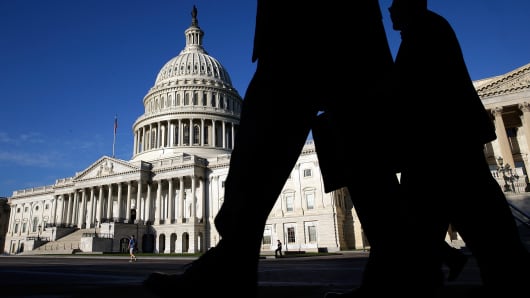Sky-high consumer confidence could mean Republicans are in for some good news on Election Day.
The latest read on consumer confidence Tuesday showed that Americans are more optimistic about further growth than they have been since 2000, according to the monthly index tracked by the Conference Board.
If history is any guide, that will make it harder for Democrats to regain control of the House this year, according to a CNBC analysis of past midterm election results.
That buoyant sentiment is being propelled by a strong labor market, as the unemployment rate remains at historic lows and wage growth shows signs of perking up. President Donald Trump wasted little time in tweeting the good news.
But the good news for consumers may spell trouble for Democrats hoping to win back control of the House in next week's midterm election. The party needs a net gain of 23 seats now held by GOP incumbents.



